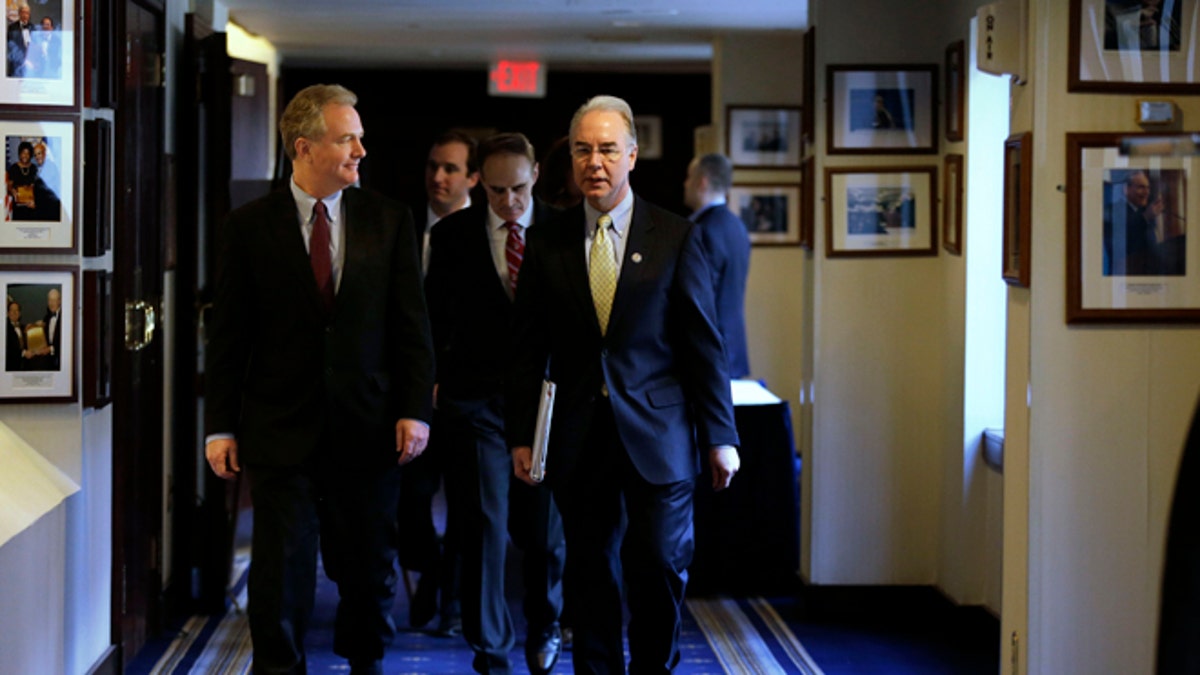
House Budget Committee Vice Chairman Rep. Tom Price, R-Ga., right, and the committee's ranking Democrat Rep. Chris Van Hollen, D-Md., left, arrive for a news conference at the National Press Club in Washington, Tuesday, Feb. 12, 2103, to speak about sequestration, the fiscal cliff and the budget. (AP Photo/Jacquelyn Martin) (AP2013)
Among the sweeping number of budget cuts that are planned to go into effect on March 1 are many that will directly impact the lives of Latinos in the United States, including cuts to the Department of Homeland Security and the education and health care budgets.
Ahead of the Friday deadline, DHS released Tuesday a number of undocumented immigrants held in detention centers around the country to save money, a controversial move that has been dominating headlines.
It was the first tangible impact of the looming budget cuts for DHS and other government agencies.
The so-called sequestration is a cover-all term for a series of automatic, across-the-board budget cuts to government agencies, split evenly between defense and discretionary spending. The cuts will total $1.2 trillion over 10 years.
The sequester — which has been coming for more than a year — is an attempt to get a grapple on the U.S. national debt, which has ballooned to more than $16 trillion dollars.
DHS Secretary Janet Napolitano told reporters at the White House Monday that across-the-board cuts would impact the department's core operations, including border security and airport screening.
She also warned that DHS might not be able to afford to keep the 34,000 immigration jail beds mandated by Congress. On average, last week there were 30,773 people being held in ICE jails.
"I don't think we can maintain the same level of security at all places around the country with sequester as without sequester," said Napolitano, adding that the impact would be "'like a rolling ball. It will keep growing."
According to the National Immigration Forum, it costs the government about $164 a day to keep an undocumented immigrant facing deportation behind bars. In a report on immigration detention costs last year, the advocacy group said costs for supervised release ranged from about 30 cents to $14 a day.
Republican lawmakers decried the releases and on Wednesday House Homeland Security Committee Chairman Michael McCaul (R-Texas) sent a strong letter to ICE Director John Morton panning the decision.
“I am concerned about the recent announcement by Immigration and Customs Enforcement (ICE) to release a large number of detained persons,” McCaul wrote. “The decision reflects the lack of resource prioritization within the Department of Homeland Security and Immigration and Customs Enforcement and is indicative of the department’s weak stance on national security.”
The administration asked for about $1.96 billion for immigration jail operations in the last budget. This amounts to about $5.4 million a day, according to the National Immigration Forum's report.
Along with the DHS cuts, many Americans Latinos will be hard hit in domestic cuts to programs that support education, healthcare and jobs, some Hispanic advocates argue.
“The effects of these cuts will hurt the economy in the short term but also in the long run, as these domestic cuts will negatively affect young mothers, children and people in lower income brackets,” said Leticia Miranda, a policy advisor at the Hispanic advocacy group the National Council of La Raza.
Included in the sequester chopping block are 5.1 percent cuts to government programs such as Women, Infants and Children (WIC), Head-Start and Title 1 Education. About 42 percent of participants in the WIC program, which provides food vouchers to low income mothers, are Latino and 300,000 young Latinos are part of the early education Head Start program.
“This program has long-term positive effects on young Latinos,” Miranda said. “None of these cuts needs to happen this year.”
These sentiments were echoed in letters to Congresswoman Barbara Mikulski, the chairwoman of the Appropriations Committee, by the heads of a number of government organizations.
“Education is the last place to be reducing our investment as the nation continues to climb out of the recent recession and to prepare its citizens to meet the challenges created by global economic competitiveness in the 21st Century,” wrote Secretary of Education Arne Duncan.
President Barack Obama will meet Friday with the top leaders in the House and Senate to discuss what to do about the automatic cuts.
The meeting is set to take place hours after the $85 billion in across-the-board cuts will have officially kicked in. This suggests both sides are operating under the assumption a deal won't be reached to avert the cuts ahead of the March 1 deadline.
The meeting reflects a move to jumpstart negotiations after weeks of inaction on cuts that both parties have said could inflict major damage to government programs, the military and the economy at large. No serious talks to avert the cuts have been under way, and Friday's meeting will be the first face-to-face discussion between Obama and Republican leaders this year.
The Associated Press contributed reporting to this piece.
Follow us on twitter.com/foxnewslatino
Like us at facebook.com/foxnewslatino











































